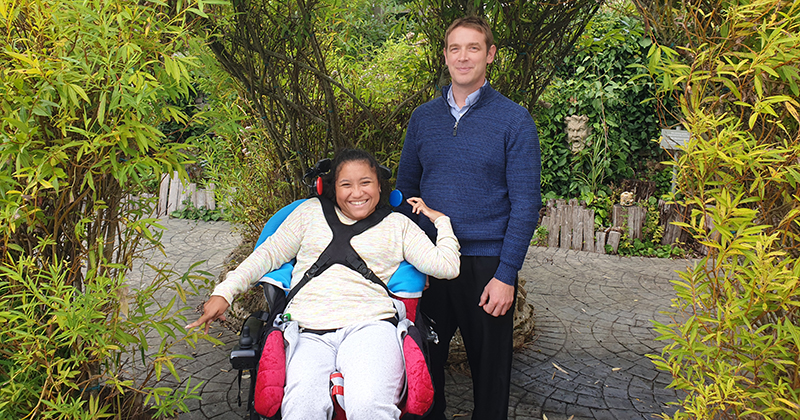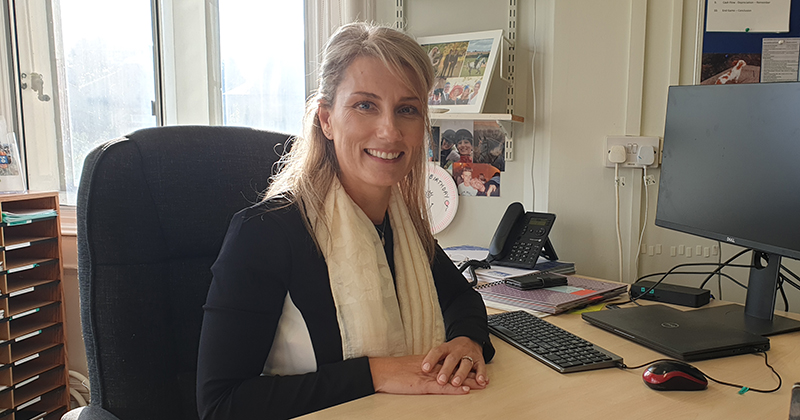From care worker to chief executive, Lynette Barrett has risen up the ranks at National Star, the adult special educational needs college in Gloucestershire. She tells Jess Staufenberg about how to keep staff during a cost-of-living crisis
Time clearly flies when you’re a member of staff at National Star.
It keeps happening as we walk around – staff are surprised at how long they’ve been here. In one classroom, I’m chatting to student Sam Vestey, who is showing me his BBC interview about why the blue disabled badge needs changing (it should feature more than just a wheelchair because some disabilities are hidden, he explains).
At one point I ask the delightful Simon Welch, college principal, how long he’s been here. He thinks for a moment, then grins: “14 years”.
In another building, the college’s irrepressible students’ union leader, Chelsea Pettitt (who seems to know literally everybody), comes scooting around the corner. She takes us to the hydrotherapy pool, where a student is in a session with two apprentice physiotherapists.
One of them, surprising even herself, explains that she’s been at the college for almost four years. Welch too is surprised. “I can’t believe that,” he exclaims.
In the music room, we meet a professional musician who now works at the college leading its music department. In the physiotherapy room, a physiotherapist runs out of fingers trying to count all the physiotherapists employed on site (turns out it’s about 30).

And as we head towards the dance room – where, brilliantly, students can use hanging ropes to spin themselves around – we continue to meet people who greet one another like old friends. The banter is endless (I particularly enjoy the mock scraping-and-bowing to Chelsea in recognition of her new elected role as campus queen).
Finally, we reach the “manor house”, or Ullenwood Manor, which was the original Star Centre back in 1967. In an upper room is newly-appointed Lynette Barrett, chief executive of the £46 million turnover organisation.
Guess when she began here?
In 2001, aged just 25.
She arrived as a care worker, with only a couple of years’ experience as a care worker and two small children at home. Since then, she has climbed up and up – from senior facilitator, to deputy manager, head of department, director of residential services and finally chief operations officer in 2017 – before landing the top job in July.
She’s also chair of Natspec, the membership association for FE providers with SEND learners.
Finding and keeping staff is core to Barrett’s mission. As the former chief operations officer, she saw the impact of the pandemic on staffing up close – too close.
“Last year was incredibly difficult. The health and social care sector was having a massive staffing crisis. People were looking to come out of health and social care.
“Suddenly I felt very out of control” she adds. “It didn’t matter how much I put in, I couldn’t sustain the quality I’d prided myself on for all those years.”
The college needs 600 facilitators (support and care workers who help students access their lessons). They are the backbone of the organisation but during the pandemic 100 of these roles went unfilled.
Everyone had to pull double their weight. Two students, due to their vulnerability to Covid-19, ended up in intensive care – mercifully, nobody died.

“My biggest concern wasn’t the 100 vacancies, my fear was that would grow,” says Barrett, wide-eyed at the thought. “I was saying to [then-CEO David Ellis] ‘we have to retain who we’ve got. For every one we lose, that’s ten years’ experience out the door.”
Barrett and Ellis jumped into action. The college had already launched a ‘training unit’ for staff in 2004, but it now changed its advertising to emphasise career progression.
Current job postings for facilitators, for example, promise a £250 ‘golden hello’ after probation, highlight a five per cent salary increase from January this year and a free college bus service from Cheltenham and Gloucester (which Barrett wants to expand). Staff who stay get a ‘commitment payment’ and those who help hire someone also get a financial reward.
At the same time, a new director of people, Elaine Gisby, was found. She moved away from text-based adverts to more videos on social media, says Barrett.
The team even switched from making people download a job form online – which needs digital skills – to ringing on a phone. Meanwhile for staff already in college, there was a big boost to internal communications “to keep staff informed and engaged”, says Barrett.

It was a huge “one-off investment” from the college’s reserves, costing £2.5 million.
And Barret herself is, of course, perhaps the best advert of all.
Things had looked a bit bleak when she was younger. She had the “attention span of a gnat” in primary school and found writing especially difficult (eventually diagnosed as dyslexia). Special support helped, and Barrett soon reached the top of her classes. But the move from a primary school with 28 pupils to a secondary with 1,200 was a disaster.
“Some of the solutions for me were very extreme. In those days you were either in mainstream, or in remedial class, with some children who had severe learning disabilities. I could not identify myself with that. So I stopped going.”
Barrett took a job as a groom at a stable, leaving school in 1991 aged 15. It didn’t work out, and she landed a hairdressing apprenticeship, working for five years until marrying and having her first son aged 21.
When I was 15 I stopped going to school
Not long after, she took on some shifts at a nursing home where her older sister worked, gaining level 2 and 3 in health and social care. When the nursing home shut, she stumbled across National Star.
How does it feel to sit here now as chief executive?
“It is a bit surreal. There was never any intention to end up here. I feel very proud, but I also feel very privileged, in terms of the trust and confidence in me as a person.”
Barrett also admits that a big part of her drive for more senior roles was a need to pay the bills.
“It was very difficult to make ends meet,” she says of her earliest years. “One of my drivers in terms of career progression was not just being ambitious, I needed to earn more money.” Even with a husband working, Barrett was feeling the bite.
Barrett’s experience might resonate with applicants for the college’s current facilitator vacancies: the advert online offers £10.50 to £10.92 an hour, or £13.13 to £13.65 at the weekend.
(It’s worth adding that the job “encourages those with no experience” to apply, pledging access to training and qualifications).
At the same time, the college’s energy bill is set to rise from £200,000 a year to half a million. The college is also due to post a “small deficit” this year and again in 2023.
But Barrett insists that she “can’t just pass that cost straight onto the local authority”. The college has already increased its charge to the local authority – where it was £100,000 per student place a year ago, it’s eight per cent higher today.
I can’t just pass the costs straight onto the local authority
So with finances tight, how can Barrett hold onto staff?
“There is something about the culture of the organisation that makes it a desirable place to be,” she says. She’s right – it’s tangible. But that’s partly because of the facilities, which look fantastic. For example there is a new £6 million residential site underway. The campus feels like an exciting, enduring place.

While the LA’s payments cover staff costs, philanthropy and fundraising must cover any capital projects, facilities and equipment like the hydrotherapy pool.
But this isn’t easy either. “There’s so much more competition out there in terms of charities, and so many were hit hard by the pandemic,” says Barrett. “A charity that supports disabled adults is not so sexy in that sense. It’s surprising how many people never rub shoulders with someone with a disability.”
Career progression and development remain a key weapon in Barrett’s arsenal for keeping her expert staff. There are 70 staff working on care apprenticeships, seven training in leadership and management in adult care, six on nursing or physiotherapy degrees and two doing post graduate qualifications.
With specialist education, the quality comes from expertise
Proving the value of providers like National Star also helps. The college is in talks with two general FE colleges outside the south-west to offer its expertise to their learners. “It could be a satellite site, or they could subcontract us,” she says, saying more detail will be announced later this year. It’s a way to show the college adds real value across the system.
And in her role as chair of Natspec, Barrett is supporting member efforts to increase the prominence of adult learners in the SEND review consultation, because it is so “school focused” (see FE Week ad nauseum).
Barrett is adamant that “whatever we end up with” from the review, local authorities are made to implement the policies. “Unless local authorities are held to account and made to follow it, it won’t work.”
Meanwhile Natspec has also expanded its own training offer to members, in an effort to keep and develop more staff, according to Barrett.
“This is not the time to cut back,” she concludes. “With the specialist education sector, the quality comes from expertise. The only way to get that, is to remain in the sector.”









Your thoughts